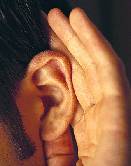
THURSDAY, Jan. 27 (HealthDay News) — Work-related hearing loss can lead to sleep problems, a new study has found.
Israeli researchers gave hearing tests to 298 male employees at a workplace where they were exposed to harmful noise and found that 99 of the workers had a hearing impairment and 199 had normal hearing. Those with hearing problems tended to be older and to have been exposed to workplace noise for a longer time.
The condition known as tinnitus, which is a continual ringing in the ears, was noted in 51 percent of those with hearing loss and 14 percent of those with normal hearing.
Tinnitus was reported as the main sleep-disrupting factor among the workers. However, insomnia and other sleep problems were also found among those with other hearing impairments, and neither age nor years on the job seemed to play a role in that finding, the researchers from Ben-Gurion University of the Negev, said in a university news release.
The study, which was carried out by medical student Tsafnat Test under supervision of Dr. Einat K. Sheiner and others, was published in the January issue of the journal Sleep.
“The homogeneous study population exposed to identical harmful noise at the same workplace allowed us to compare sleep quality between similar groups differing only by hearing status,” Test explained in the news release.
More information
The U.S. Centers for Disease Control and Prevention outlines how to protect yourself against noise-induce hearing loss.

